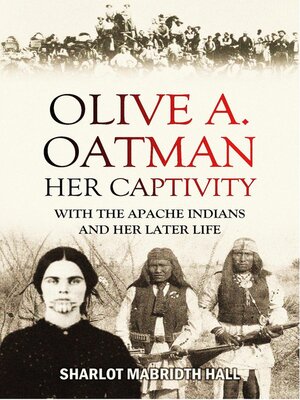Olive A. Oatman
ebook ∣ Her Captivity with the Apache Indians and Her Later Life (1908)
By Sharlot Mabridth Hall

Sign up to save your library
With an OverDrive account, you can save your favorite libraries for at-a-glance information about availability. Find out more about OverDrive accounts.
Find this title in Libby, the library reading app by OverDrive.



Search for a digital library with this title
Title found at these libraries:
| Library Name | Distance |
|---|---|
| Loading... |
"Sharlot Hall...a noted historian of Arizona, had informed him that Olive had two children while among her captors." - The Oatman Massacre: A Tale of Desert Captivity and Survival (2014)
"Sharlot Hall moved to Arizona...in 1882...traveled through the territory to collect oral histories from old settlers...served as territorial historian." - Derzipilski, Arizona (2004)
"In 1906 Joseph Fish claimed that Arizona historian Sharlot Hall had told him Olive had two children, one of whom still visited Fort Yuma."- Captive Arizona, 1851-1900 (2009)
"Sharlot Mabridth Hall was an unusual woman for her time: a largely self-educated but highly literate child of the frontier...Her earliest memories were of Comanche raids." -sharlothallmuseum.org
Perhaps no single person is more qualified to tell the famous story of the Oatman captivity by Apaches than Arizona territorial historian Sharlot Hall (1870 -1943), who herself had memories of Apache raids and interviewed the early pioneers of Arizona.
In 1908, Hall would write a short, but historically important and frequently cited, 20-page account of the Oatman captivity, titled, "Olive A. Oatman: Her Captivity with the Apache Indians and Her Later Life."
In introducing her work, Hall writes:
"Stories of the captivity of white women with various Indian tribes have been part of the romance and tragedy of the frontier from New England westward; but the Apaches of the Southwest seldom burdened themselves for any length of time with white captives of either sex, and Olive A. Oatman is the only white woman who survived the hardships of an extended captivity among them."







